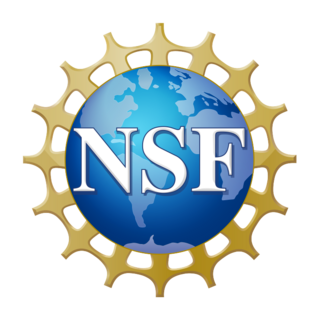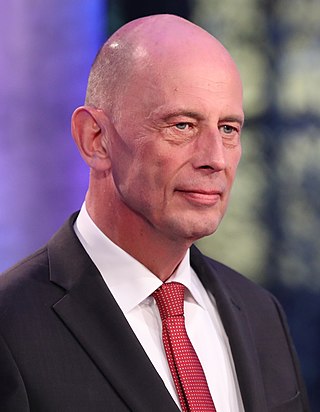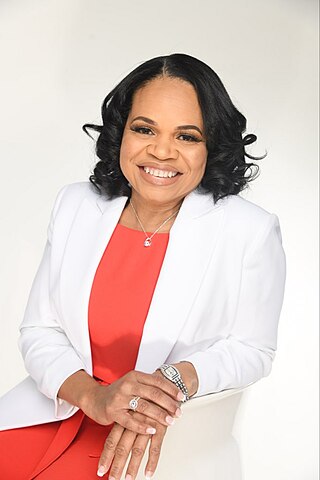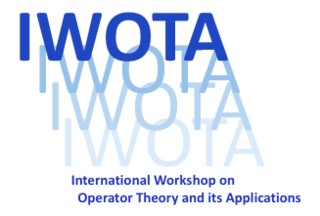Related Research Articles
The Association for Computing Machinery (ACM) is a US-based international learned society for computing. It was founded in 1947 and is the world's largest scientific and educational computing society. The ACM is a non-profit professional membership group, reporting nearly 110,000 student and professional members as of 2022. Its headquarters are in New York City.

The Internet Engineering Task Force (IETF) is a standards organization for the Internet and is responsible for the technical standards that make up the Internet protocol suite (TCP/IP). It has no formal membership roster or requirements and all its participants are volunteers. Their work is usually funded by employers or other sponsors.
The National Science Foundation Network (NSFNET) was a program of coordinated, evolving projects sponsored by the National Science Foundation (NSF) from 1985 to 1995 to promote advanced research and education networking in the United States. The program created several nationwide backbone computer networks in support of these initiatives. It was created to link researchers to the NSF-funded supercomputing centers. Later, with additional public funding and also with private industry partnerships, the network developed into a major part of the Internet backbone.

The U.S. National Science Foundation (NSF) is an independent agency of the United States federal government that supports fundamental research and education in all the non-medical fields of science and engineering. Its medical counterpart is the National Institutes of Health. With an annual budget of about $9.9 billion, the NSF funds approximately 25% of all federally supported basic research conducted by the United States' colleges and universities. In some fields, such as mathematics, computer science, economics, and the social sciences, the NSF is the major source of federal backing.

Wolfgang Tiefensee is a German politician of the Social Democratic Party (SPD). He was the Federal Minister for Transport, Building and Urban Development in the grand coalition cabinet led by Angela Merkel between 2005 and 2009. Since 2014, he has been the State Minister of Economy, Science and the Digital Society in the government of Thuringia's Minister-President Bodo Ramelow.

The National Science Board (NSB) of the United States establishes the policies of the National Science Foundation (NSF) within the framework of applicable national policies set forth by the president and the Congress. The NSB also serves as an independent policy advisory body to the president and Congress on science and engineering research and education issues. The board has a statutory obligation to "...render to the President and to the Congress reports on specific, individual policy matters related to science and engineering and education in science engineering, as Congress or the President determines the need for such reports,". All board members are presidential appointees. NSF's director serves as an ex officio 25th member and is appointed by the president and confirmed by the US Senate.

Gerhard "Gerd" Müller is a German politician of the Christian Social Union in Bavaria, who is currently serving as Director General of the United Nations Industrial Development Organization since 2021.

Philip E. Rubin is an American cognitive scientist, technologist, and science administrator known for raising the visibility of behavioral and cognitive science, neuroscience, and ethical issues related to science, technology, and medicine, at a national level. His research career is noted for his theoretical contributions and pioneering technological developments, starting in the 1970s, related to speech synthesis and speech production, including articulatory synthesis and sinewave synthesis, and their use in studying complex temporal events, particularly understanding the biological bases of speech and language.
Christine L. Borgman is a distinguished Professor and Presidential Chair in Information Studies at UCLA. She is the author of more than 200 publications in the fields of information studies, computer science, and communication. Two of her sole-authored monographs, Scholarship in the Digital Age: Information, Infrastructure, and the Internet and From Gutenberg to the Global Information Infrastructure: Access to Information in a Networked World, have won the Best Information Science Book of the Year award from the American Society for Information Science and Technology. She is a lead investigator for the Center for Embedded Networked Sensing (CENS), a National Science Foundation Science and Technology Center, where she conducts data practices research. She chaired the Task Force on Cyberlearning for the NSF, whose report, Fostering Learning in the Networked World, was released in July 2008. Prof. Borgman is a Fellow of the American Association for the Advancement of Science (AAAS), a Legacy Laureate of the University of Pittsburgh, and is the 2011 recipient of the Paul Evan Peters Award from the Coalition for Networked Information, Association for Research Libraries, and EDUCAUSE. The award recognizes notable, lasting achievements in the creation and innovative use of information resources and services that advance scholarship and intellectual productivity through communication networks. She is also the 2011 recipient of the Research in Information Science Award from the American Association of Information Science and Technology. In 2013, she became a fellow of the Association for Computing Machinery.

Annie Antón is an academic and researcher in the fields of computer science, mathematical logic, and bioinformatics.

Carlos Castillo-Chavez is a Mexican-American mathematician who was Regents Professor and Joaquín Bustoz Jr. Professor of Mathematical Biology at Arizona State University. Castillo-Chavez was founder and the Executive Director of the Mathematical and Theoretical Biology Institute (MTBI) and the Institute for Strengthening the Understanding of Mathematics and Science. For 2019, Castillo-Chavez was Provost Visiting Professor in the Applied Mathematics Division and Data Science Initiative at Brown University. Castillo-Chavez retired from Arizona State University at the end of spring 2020.

Lawrence Jay Rosenblum is an American mathematician, and Program Director for Graphics and Visualization at the National Science Foundation.

The California Institute for Telecommunications and Information Technology (Calit2, previously Cal(IT)2), also referred to as the Qualcomm Institute (QI) at its San Diego branch, is a collaborative academic research institution of the University of California San Diego (UC San Diego), the University of California, Irvine (UCI), and University of California, Riverside. Calit2 was established in 2000 as one of the four UC Gray Davis Institutes for Science and Innovation. As a multidisciplinary research institution, it is conducting research and educational programming to leverage emerging technologies to improve the state's economy and citizens' quality of life, while addressing large-scale societal issues. Calit2 also develops and deploys prototype infrastructure for testing new solutions in real-world environments.

Tony Fan-Cheong Chan is a Chinese American mathematician who has been serving as President of the King Abdullah University of Science and Technology (KAUST) since 2018. Prior to that, he was President of the Hong Kong University of Science and Technology from 2009 to 2018.

Subra Suresh is an Indian-born American engineer, materials scientist, and academic leader. He is currently Professor at Large at Brown University and Vannevar Bush Professor of Engineering Emeritus at the Massachusetts Institute of Technology (MIT). He was Dean of the School of Engineering at MIT from 2007 to 2010 before being appointed as Director of the National Science Foundation (NSF) by Barack Obama, where he served from 2010 to 2013. He was the president of Carnegie Mellon University (CMU) from 2013 to 2017. Between 2018 and 2022, he was the fourth President of Singapore's Nanyang Technological University (NTU), where he was also the inaugural Distinguished University Professor.
The White House BRAIN Initiative is a collaborative, public-private research initiative announced by the Obama administration on April 2, 2013, with the goal of supporting the development and application of innovative technologies that can create a dynamic understanding of brain function.
Judith L. Klavans is a linguist and computer scientist. She has been active in academia, industry and government in furthering the development and application of computational approaches to the study of language, with publications in areas including speech synthesis, machine translation, the development of resources and corpus analysis, internet addiction, information retrieval, and automatic summarization. Her technologies have been applied in fields ranging from medical informatics, cybersecurity, database interoperability, cultural heritage institutions and Digital Government.

Ashanti Johnson is an American geochemist and chemical oceanographer. She is the first African American to earn a doctoral degree in oceanography from Texas A&M University.

International Workshop on Operator Theory and its Applications (IWOTA) was started in 1981 to bring together mathematicians and engineers working in operator theoretic side of functional analysis and its applications to related fields. These include:
Ibrahim "Abe" Moussa Baggili is a cybersecurity and digital forensics scientist at Louisiana State University with a joint appointment between the college of engineering and the Center for Computation and Technology. Before that, he was the founder and director of the Connecticut Institute of Technology (CIT) at the University of New Haven. Baggili was also a full professor and Elder Family Endowed Chair at UNewHaven. He has a B.S., M.S., and Ph.D. in Computer and Information Technology from Purdue University's Purdue Polytechnic Institute. Baggili is a Jordanian/Arab American first generation college graduate and a well-known scientist in the domain of Cyber Forensics and Cybersecurity with seminal peer-reviewed work in the areas of Virtual Reality Forensics (VR) and security, mobile device forensics and security, application forensics, drone forensics and memory forensics.
References
- ↑ "Digital Government Society". UIA (Union of International Associations).
- ↑ NSF Media (15 May 2000). "NSF Creates Partnership to Further Digital Government".
- 1 2 3 "NSF Creates Partnership to Further Digital Government". National Science Foundation. May 15, 2000. Retrieved 6 July 2017.
 This article incorporates text from this source, which is in the public domain .
This article incorporates text from this source, which is in the public domain . - ↑ "Board Members | DGS". Archived from the original on 2024-01-15. Retrieved 2024-02-25.
- ↑ "Board Members 2024 | DGS" . Retrieved 2024-07-31.
- ↑ Pardo, Theresa (22 Jun 2008). "China and U.S. Collaborate on Digital Government Research". GovTech.